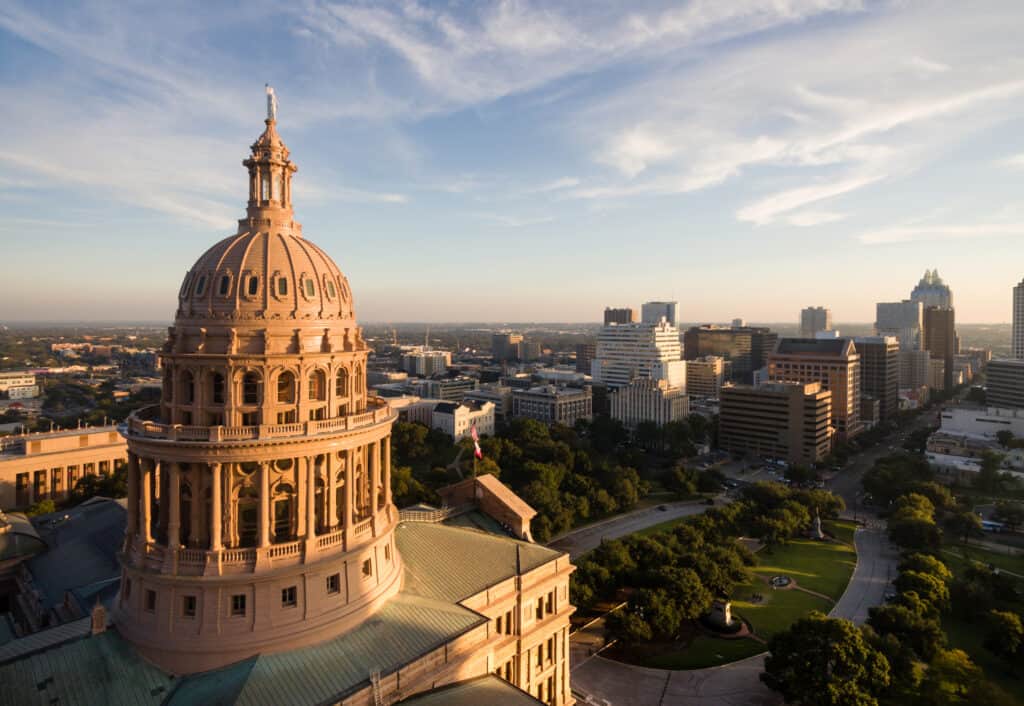In recent years, the issue of security in houses of worship has become a growing concern.
Responding to these concerns, Texas adopted a law allowing churches, synagogues, and other established places of worship to establish their own volunteer security teams without obtaining a license from the state.
These teams can provide an extra layer of protection to visitors while attending religious services.
Still, there are specific requirements that must be met for these volunteers to lawfully serve in such capacities.
Under the Texas law, volunteers providing security services in houses of worship must:
- be unpaid
- provide their services on the premises of the religious establishment
- not wear a badge or uniform that identifies them as security or gives the impression that they are law enforcement or personal protection officers
Additionally, houses of worship have the freedom to create their own minimum training and competency requirements for volunteer security personnel (insurance requirements may be different than this).
Key Takeaways
- Texas law permits houses of worship to establish volunteer security teams without a state license.
- Volunteer security members can carry firearms following state law.
- Training requirements for these teams are determined by individual houses of worship.
Understanding Texas Law and Armed Volunteering
Legal Framework and Regulations
Under Texas law, churches, synagogues, and other established places of worship are permitted to establish their own security teams without the need for a state license or permission.
These teams must be composed of unpaid volunteers providing services on the premises of the religious establishment.
It’s important that these individuals do not wear badges or uniforms that identify them as security personnel, or give the impression that they are law enforcement or personal protection officers, to avoid confusion.
Additionally, Texas law grants these places of worship the autonomy to set their own minimum training and competency requirements for these volunteer security teams. This allows for tailored security measures that suit each establishment’s unique needs.
In terms of firearms, volunteer security members are allowed to carry them in accordance with state law.
Furthermore, while Texas law does not specifically prohibit the carrying of firearms in places of worship, restrictions that apply to schools or government buildings could affect congregations meeting in such locations.
Roles of the Attorney General and the Department of Public Safety
In the context of armed volunteering in houses of worship, the Texas Attorney General, currently Ken Paxton, plays a role in providing information and guidelines on the legal framework.
The Office of the Attorney General makes available resources and offers a brochure called Volunteer Security in Houses of Worship (PDF) that helps churches and other religious establishments navigate the complex terrain of volunteer security and associated laws.
On the other hand, the Texas Department of Public Safety is in charge of issuing Licenses to Carry a Handgun, which might be required for some volunteer security members.
Furthermore, Texas law also allows churches, synagogues, and other established places of worship to utilize paid security services from either law enforcement officers or individuals licensed to provide private security, as provided under Chapter 1702 of the Texas Occupations Code.
Operational Aspects of Volunteer Security Teams
In Texas, volunteer security teams in houses of worship have the flexibility to develop their own training programs and preparedness plans.
These plans are crafted to meet the unique needs of each religious establishment, ensuring that volunteers are well-prepared for the specific security challenges they may face.
This autonomy allows for a diverse range of training approaches, tailored to the congregation’s size, location, and other relevant factors.
Collaboration with law enforcement is an important aspect of operational strategy for these teams.
While volunteers provide the primary security presence, establishing a relationship with local law enforcement agencies enhances overall safety measures.
This collaboration can take various forms, such as joint training sessions, sharing of best practices, or regular communication channels to discuss security concerns and coordinate responses to potential threats.
Additionally, while volunteer security team members may carry firearms under state law, their role is primarily to observe and report, acting as a deterrent and first line of defense.
The emphasis is on de-escalation and safety, with armed intervention as a last resort.
These operational aspects highlight the importance of a well-thought-out security strategy that integrates volunteer preparedness with community-based resources, ensuring a safe environment for worship without compromising the welcoming nature of these spaces.
Armed Volunteers in Action
Past Incidents and Responses
In recent years, there have been several tragic incidents that highlighted the need for security in houses of worship, such as the Sutherland Springs church shooting and the West Freeway Church of Christ incident.
Texas law acknowledges the necessity for security measures and permits churches, synagogues, and other established places of worship to establish volunteer security teams without obtaining a license or permission from the state.
Grant Funding and Additional Resources
To further strengthen security measures in houses of worship, Texas Attorney General Ken Paxton provides grant funding opportunities and resources for security training programs.
Armed volunteers are not only a form of life-saving response to potential threats but also serve as a preventive strategy, deterring potential attackers.
By proactively engaging in strategic planning, preventive measures, and resource allocation, houses of worship in Texas can better ensure the safety of worshipers and maintain a secure environment for their congregations.
Frequently Asked Questions
What legal protections are provided by the Texas Church Security Protection Act?
The Texas Church Security Protection Act allows churches, synagogues, and other established places of worship to create security teams without obtaining a license or permission from the state if certain requirements are met. Individuals providing security services must be unpaid volunteers, provide services on the premises, and not wear a badge or uniform that identifies them as security or creates the impression that they are law enforcement officers or personal protection officers.
How do Texas laws govern the formation and actions of security teams within places of worship?
Texas law permits places of worship to establish their own minimum training and competency requirements for volunteer security services. Volunteer security team members may carry firearms only when otherwise allowed by state law.
What requirements must be met for certification in church security training in Texas?
While Texas law does not explicitly require certification in church security training, places of worship may choose to create minimum training and competency requirements that may be appropriate for their volunteer security services.
Under Texas Senate Bill 2065, what are the guidelines for volunteers providing security in houses of worship?
Senate Bill 2065 outlines the guidelines for volunteers providing security in houses of worship, including that the volunteers must be unpaid and not wear any clothing or badges resembling those of law enforcement or personal protection officers. The bill also states that they must provide their security services on the premises of the house of worship.
Is it permissible for members of church security in Texas to detain individuals using handcuffs?
The provided information does not explicitly mention the use of handcuffs by volunteer security teams in Texas houses of worship. As always, follow all state and federal laws.








